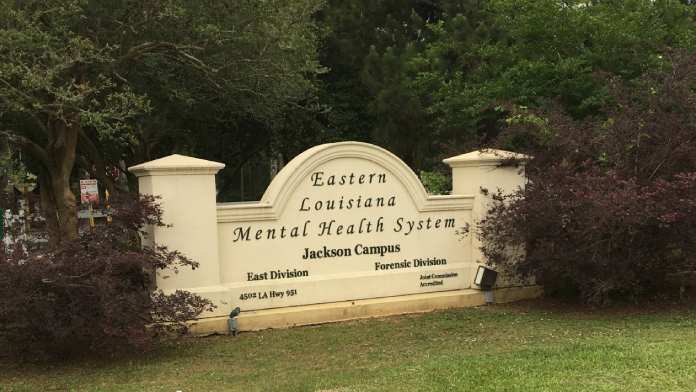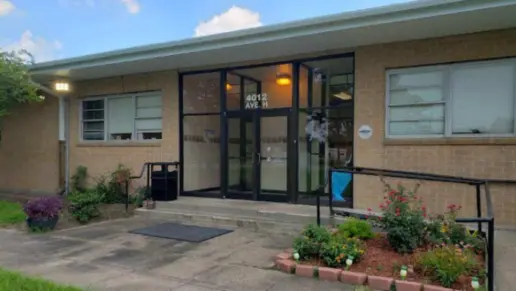I'm thankful for this place, they have helped me, and they are also kind to me. They make me feel like I've got someplace to feel comfortable. Thank you for being so nice.
About East Louisiana State Hospital
Eastern Louisiana Mental Health System is out in Jackson, Louisiana. When you go there for your mental and behavioral health conditions, you’ll find a wide range of options. This includes a track for tackling addictions. This includes folks who’re incarcerated or under court order. Most of their services are for inpatient care, and they have 470 psychiatric beds.
Their facility is divided into two wings. One is for correctional inmates and adults who are under court orders. There’s a stabilization program for acute cases. There are also evaluations and treatment for men whose needs aren’t as critical. Their inmate division is in constant contact with correctional facilities, so you’ll be referred to different agencies at various times, depending on your needs and your progress in your sentence.
The East Division is the second department. They handle all adults who need long term psychiatric care. They have stabilization and therapy for individuals and groups. You’ll have time to reflect on your own progress as well as learning from and helping others recover. There’s also a community home that has life skills programs and job training. You’ll stay with others who’re also prepping to head back into the job market and support their families. If you’re ready to go back to your neighborhood and look for steady work, you can share tips and experiences.
In addition to psychiatric care, there’s a medical clinic that’s open 24/7. Nurses, social workers, and pastors are also available if you need them. While in the center, your dietary needs will also be assessed so that you’ll be fit. Dieticians can meet with your family and discuss options to improve your nutrition at home.
Facility Overview
Latest Reviews
Rehab Score
Gallery

Location
Accepted Insurance
Other Forms of Payment
Medicaid is a state based program that helps lower-income individuals and families pay for healthcare. Medicaid covers addiction treatment so those enrolled can use their coverage to pay for rehab. When a program accepts Medicaid the client often pays very little or nothing out of their own pocket.
Private insurance refers to any kind of healthcare coverage that isn't from the state or federal government. This includes individual and family plans offered by an employer or purchased from the Insurance Marketplace. Every plan will have different requirements and out of pocket costs so be sure to get the full details before you start treatment.
Self-pay involves paying for treatment out of your own pocket. You can use savings or credit, get a personal loan, or receive help from family and friends to fund your treatment. If you don't have insurance or your insurance plan doesn't cover a specific program, self-pay can help ensure you still get the care you need.
Financial aid can take many forms. Centers may have grants or scholarships available to clients who meet eligibility requirements. Programs that receive SAMHSA grants may have financial aid available for those who need treatment as well. Grants and scholarships can help you pai for treatment without having to repay.
Medicare is a federal program that provides health insurance for those 65 and older. It also serves people under 65 with chronic and disabling health challenges. To use Medicare for addiction treatment you need to find a program that accepts Medicare and is in network with your plan. Out of pocket costs and preauthorization requirements vary, so always check with your provider.
Addiction Treatments
Levels of Care
Treatments
Many of those suffering from addiction also suffer from mental or emotional illnesses like schizophrenia, bipolar disorder, depression, or anxiety disorders. Rehab and other substance abuse facilities treating those with a dual diagnosis or co-occurring disorder administer psychiatric treatment to address the person's mental health issue in addition to drug and alcohol rehabilitation.
Mental health rehabs focus on helping individuals recover from mental illnesses like bipolar disorder, clinical depression, anxiety disorders, schizophrenia, and more. Mental health professionals at these facilities are trained to understand and treat mental health issues, both in individual and group settings.
Programs


Clinical Services
Cognitive Behavioral Therapy (CBT) is a therapy modality that focuses on the relationship between one's thoughts, feelings, and behaviors. It is used to establish and allow for healthy responses to thoughts and feelings (instead of unhealthy responses, like using drugs or alcohol). CBT has been proven effective for recovering addicts of all kinds, and is used to strengthen a patient's own self-awareness and ability to self-regulate. CBT allows individuals to monitor their own emotional state, become more adept at communicating with others, and manage stress without needing to engage in substance abuse.
When you participate in dialectical behavior therapy, you'll work on recognizing distorted thinking patterns that are guiding your emotions. You'll learn how to change these patterns to eliminate unproductive reactions. This involves developing better coping mechanisms to handle stressful situations.
Group therapy is any therapeutic work that happens in a group (not one-on-one). There are a number of different group therapy modalities, including support groups, experiential therapy, psycho-education, and more. Group therapy involves treatment as well as processing interaction between group members.
In individual therapy, a patient meets one-on-one with a trained psychologist or counselor. Therapy is a pivotal part of effective substance abuse treatment, as it often covers root causes of addiction, including challenges faced by the patient in their social, family, and work/school life.
In Louisiana, trauma therapy helps you explore the impact that a traumatic event has had on your life. You can experience emotional and physical responses if you witness or experience a traumatic event. Your therapist guides you in processing the trauma and then developing coping strategies that improve your quality of life.
An integral part of addiction rehab in Louisiana is life skills training. This training equips you for the daily tasks you'll need to successfully navigate post treatment. Training may include employment coaching, stress management techniques, financial budgeting, and interpersonal skill development.
Nutrition therapy, aka medical nutrition therapy (MNT), is a way of treating physical, emotional, and medical conditions through diet. Specific dietary plans are designed by professional nutritionists or registered dietitians, and patients follow them in order to positively affect their physical and mental health.
Recreational therapy offers you a holistic approach to drug and alcohol addiction treatment. It integrates activities like hiking, art, and team sports to improve your mental and physical health. These activities give you an emotional outlet, help reduce your stress, and fosters social connections as you rebuild your life and maintain sobriety.
Experiential therapy is a form of therapy in which clients are encouraged to surface and work through subconscious issues by engaging in real-time experiences. Experiential therapy departs from traditional talk therapy by involving the body, and having clients engage in activities, movements, and physical and emotional expression. This can involve role-play or using props (which can include other people). Experiential therapy can help people process trauma, memories, and emotion quickly, deeply, and in a lasting fashion, leading to substantial and impactful healing.
Nicotine Replacement Therapy (NRT) is a way of getting nicotine into the bloodstream without smoking. It uses products that supply low doses of nicotine to help people stop smoking. The goal of therapy is to cut down on cravings for nicotine and ease the symptoms of nicotine withdrawal.
Amenities
-
Residential Setting
-
Private Rooms
Contact Information
4502 Highway 951
Jackson LA, 70748







